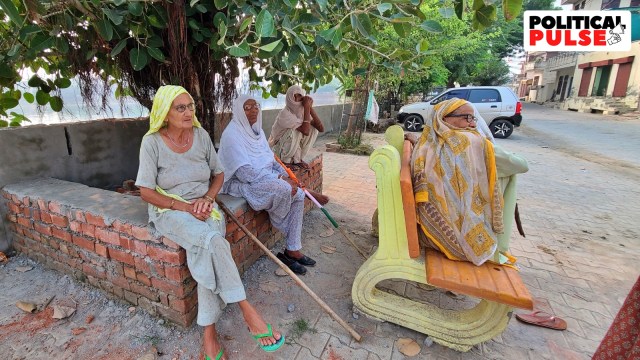In Haryana, how women voters are powering change: ‘Ghunghat-vunghat sab ud gaya’
While BJP and Cong have fielded only 12 and 10 women candidates respectively, women voters pitch for more female representation in state Assembly and Parliament
 Resident of the village Katlaheri talking with Indian Express team regarding upcoming elections of Haryana. Express photo by Jasbir Malhi
Resident of the village Katlaheri talking with Indian Express team regarding upcoming elections of Haryana. Express photo by Jasbir Malhi “Ghunghat-vunghat sab ud gaya, yeh khula desh hua. Abhi to sab madam bani baithi hain (The veil has flown away, it’s a free country now. Everyone is now an educated woman),” says Mansa Devi, sitting by a pond in Katlaheri village near Karnal.
Mansa’s words highlight rising empowerment of women in Haryana – the state once infamous for its skewed sex ratio, which has improved from 833 girls per 1,000 boys at birth in 2011 to 921 girls in 2023.
Katlaheri village not only has a woman sarpanch Dimple, but also boasts of having a female drone operator, known as “drone didi”. Unlike the past, when women’s voting choices were dictated by men (or “gents” as they say in Haryana villages), more women now vote independently in the state.
 Nindo showing self-help group card “Aparna ke Maragdarshan se” at Naurta village near Indri, Karnal in Haryana. (Express photo by Jasbir Malhi )
Nindo showing self-help group card “Aparna ke Maragdarshan se” at Naurta village near Indri, Karnal in Haryana. (Express photo by Jasbir Malhi )
It is another matter that in the October 5 Assembly polls the incumbent BJP and the principal Opposition Congress have fielded only 12 and 10 women candidates out of 90 seats, respectively.\
Sitting at her sewing machine in a house bearing her nameplate, Dimple smiles when asked about the upcoming elections. “People have become very wise, they don’t reveal their preferences. We’ll only know when the votes are cast,” she says.
Dimple, who completed Plus Two (Class XII) before marrying Sunil Kumar, a liquor vendor in Gurugram, says she became sarpanch by default. “The villagers initially chose my husband as the candidate, but since the seat was reserved for women — Haryana has 50% reservation for women in panchayat bodies — I was nominated.”
 (R) Sita Devi (36-year-old) drone didi at village Katlaheri in Haryana’s Karnal (Express Photo) (L) Drone didi talking with Indian Express team. (Express photo by Jasbir Malhi)
(R) Sita Devi (36-year-old) drone didi at village Katlaheri in Haryana’s Karnal (Express Photo) (L) Drone didi talking with Indian Express team. (Express photo by Jasbir Malhi)
However, her sarpanch position has transformed her. As her mother-in-law puts it, “Sign toh issi ke hote hain. (After all, she signs the papers).” Dimple also asserts that she has now understood the power of a sarpanch and what it takes to get work done in the village.
In Naurta village, sarpanch Neelam Devi, whose picture is fixed atop its tall entrance gate, attends meetings with block development officers and sometimes even the Karnal deputy commissioner.
“In the past, officials would accept proxy attendance, but now the administration expects women sarpanchs to attend meetings in person,” says a health department official, who fills out a form on leprosy while sitting in Neelam’s living room.
In Katlaheri village, while Dimple became sarpanch accidentally, Sita Devi, whose house lies in a narrow, inaccessible lane, chose her path as a “drone didi”.
“I am a member of the Haryana Vigyan Manch, and I responded when they (IFFCO) called for applications for drone operators from self-help group (SHG) members,” says Sita, whose husband, a graduate, encouraged her to complete her graduation and B.Ed after their marriage in 2007.
Her qualifications proved valuable, as graduation was a requirement to become a drone operator. After a 15-day training at Pataudi village in Gurugram in October 2023, Sita now runs a thriving business, using a drone provided by the central government to spray pesticides over farmlands. This kharif season, she has sprayed pesticides on 800 acres, earning Rs 2.90 lakh at Rs 350 per acre.
 Dimple Sarpanch of the village Katlaheri, district Karnal of Haryana at her residence talking with Indian Express team. (Express photo by Jasbir Malhi)
Dimple Sarpanch of the village Katlaheri, district Karnal of Haryana at her residence talking with Indian Express team. (Express photo by Jasbir Malhi)
“I never imagined I’d earn so much,” says a proud Sita, who was invited by Prime Minister Narendra Modi to an event in Delhi earlier this year. She now plans to buy more drones.
The election matters, that once rarely figured in talks among women of the state, have now become a part of routine conversations among them, particularly among the SHG (self-help group) members, who receive government loans and are aware of various schemes.
“These SHGs have been a tool of emancipation for women from underprivileged sections in rural Haryana,” says Vandna Arya, a health department official from Karnal who did her postgraduation thesis in social work on the SHGs.
In Naurta village, Nindro, a helper working with sarpanch Neelam Devi, serves tea and shares information about her SHG, saying that “some women have repaired their houses and others have set up their businesses”.
In Katlaheri village, a Dalit resident Neelam runs a micro bee-keeping business, which she started with seed money from her SHG. “The bees are like my babies,” she says, explaining how a dealer from Kurukshetra visits her village to buy honey from her.
While SHGs have been a game changer for women from the vulnerable sections, the girl education boosted by the “Beti Bachao, Beti Padhao” campaign has also empowered women regardless of their caste or economic background.
While Haryana’s literacy rate has improved from 71.42% in 2011 to 75.5 % in 2023, things seem to have changed on the ground.
 (R) Neelam sarpanch of the village Narauta village talking with Indian Express team. (Express photo by Jasbir Malhi) (L) Main entrance gate of the village. (Express photo by Jasbir Malhi)
(R) Neelam sarpanch of the village Narauta village talking with Indian Express team. (Express photo by Jasbir Malhi) (L) Main entrance gate of the village. (Express photo by Jasbir Malhi)
Walk into any village now, and you’ll see as many girl students as boys, and the higher you go up the education levels, you would still find a significant percentage of girls there.
In 2015, Haryana barred illiterate women from contesting the panchayat polls. The decision was challenged but was upheld by the apex court. Amarjeet Kaur, the woman sarpanch of Bara village in Ambala district, sees it as a “positive development”. “My parents only educated me until Class X, but I made sure my two daughters completed their graduation and post-graduation,” says Kaur, adding that her younger daughter, who completed her
MSc course, has been applying for various jobs. “She is a teacher in a private school, but she’s trying her best to secure a better job,” Kaur adds.
Sita Devi, whose daughter is in Class IX, wants her to become a police officer. “I want to see her as an ASI,” she says.
Saroj Bala, an auxiliary nurse and midwife (ANM) from Indri, a small town near Karnal, says she has witnessed a major change in attitudes toward girls during her 18 years of fieldwork. “From not educating girls to empowering them with not just a degree but a diploma that can secure them a job, there has been a significant shift in the state’s rural landscape.”
While political parties may not be fielding many women candidates, women voters from different parts of the state pitch for more female representation in the Assembly and Parliament. As Sita says, “It would be easier for the women legislators to empathise with our challenges and empower us.”
Sita and her SHG members are now looking to cast their votes on October 5. On whether they seek their menfolk’s advice for it, Nindro speaks for many when she says, “Nah ji (No), we don’t need anyone else’s help.”
Photos




- 01
- 02
- 03
- 04
- 05



























